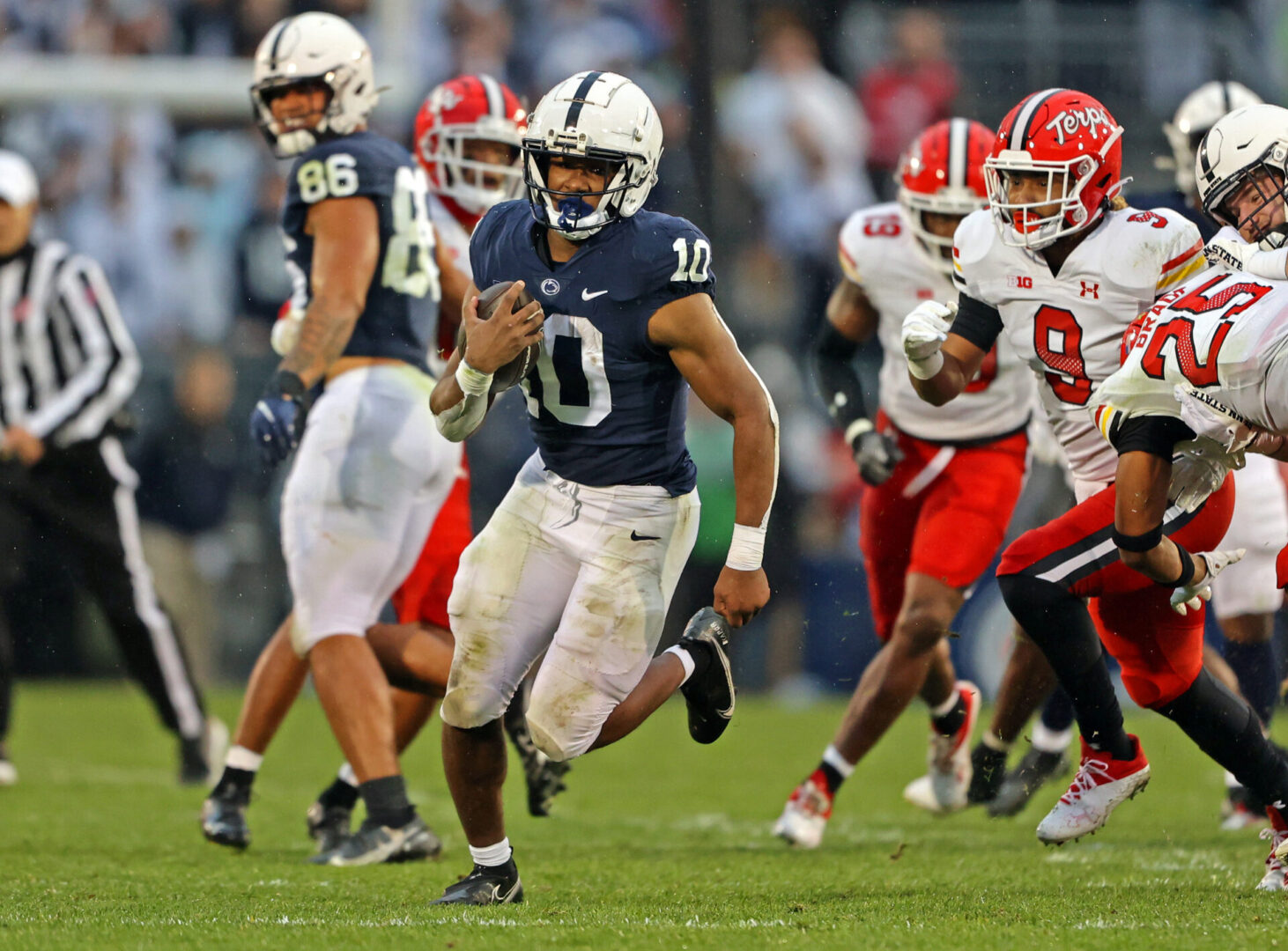
Running back Nicholas Singleton had touchdown runs of 27 and 45 yards against Maryland Saturday in Beaver Stadium. Photo by Paul Burdick | For StateCollege.com

Running back Nicholas Singleton had touchdown runs of 27 and 45 yards against Maryland Saturday in Beaver Stadium. Photo by Paul Burdick | For StateCollege.com
Nicholas Singleton and Kaytron Allen.
Or, is it Kaytron Allen and Nicholas Singleton?
On Saturday, in Penn State’s 30-0 win over a totally outmanned Maryland in a soggy Beaver Stadium, it was Singleton who was No. 1. More accurately, it was Singleton fourth-and-1. Twice.
In the first half, with the outcome of the blowout still in doubt to a degree, on a pair of fourth-and-1s, Singleton was looking for the first down first, but broke out and broke free into the end zone, scoring on runs of 45 yards and then 27 yards.
Singleton finished with 122 rushing yards on a very efficient 11 carries. It was his third game over 100 yards in 2022 and his first since gaining 124 yards and scoring two TDs on 10 carries in Week 3 at Auburn. He also ran for 179 yards and two scores on 10 carries in the home opener against Ohio.
Singleton is on pace to become only the third running back in Penn State history to rush for over 1,000 yards as a freshman. Here’s where he stands with games at Rutgers (Nov. 19), at home against Michigan State (Nov. 26) and a bowl game (TBA) to go. He’ll need 66.4 yards per game to hit the thousand-yard mark. The breakdown:
| Player | Year | Carries | Yards | Avg. | TD |
| Saquon Barkley | 2015 | 182 | 1,076 | 5.91 | 7 |
| D.J. Dozier | 1983 | 174 | 1,002 | 5.75 | 7 |
| Nicholas Singleton | 2022 | 123 | 801 | 6.51 | 10 |
Now, 10 games and an 8-2 record into the season, the two freshman running backs have combined for over 1,400 yards rushing — Singleton has 801 yards, while Allen has 631 yards.
Their number of carries has been nearly identical, with Singleton toting the ball 123 times and Allen with 122. Talk about equal opportunity.
The biggest difference? Big runs.
Singleton has had nine runs over 20 yards in 2022, and one pass reception over 20. Allen has had two runs and three receptions for more than 20 yards. Singleton has had runs of 70, 54, 53, 48, 45, 44, 30, 27 and 21 yards.
The Nittany Lion coaching troika of James Franklin, offensive coordinator Mike Yurcich and running backs coach Ja’Juan Seider get credit for adroitly balancing the health and production of the two young backs into the heart of November.
Other than Singleton and Allen, there is little in the Nittany Lions’ running game tank these days – unless you count walk-on Tank Smith. Three running backs from the Nittany Lions’ 2021 roster are gone: Noah Cain transferred to LSU in January. Caziah Holmes left Penn State during summer camp and landed at Florida State. Devyn Ford left the squad at the beginning of October, after carrying the ball just seven times in 2022 (all at Auburn).
Keyvone Lee, the Nittany Lions’ leading rusher in 2020 (438 yards) and 2021 (530), has been battling an injury and last carried the ball (one time for 6 yards) on Oct. 10 at Michigan. Overall, Lee has just 25 carries for 94 yards this year.
Lee started the first two games of 2022, but after that, Singleton has had six starts and Allen has had two.
Singleton is the more explosive outside runner of the two freshmen, while Allen does his best work between the tackles. They are a potent 1-2 combo.
It does seem they have the potential to be Penn State’s first pair of running backs to each rush for 1,000 yards in the same season, though not likely in 2022. To reach 1,000, Allen needs to average 123 yards for the next three games; his high this year is 111 vs. Central Michigan.
There is still room for improvement. In Penn State’s two biggest games of 2022 — and most years, TBH — the freshmen were only OK.
At Michigan, they evenly split a dozen carries, combining for just 35 yards rushing.
Against Ohio State, Allen ran 12 times for 76 yards and a TD, while Singleton had just 45 yards on 14 carries.
In total, for the two backs and two Big Ten big games, that’s 38 carries for 151 yards — a good but not great 3.97 yards per carry. Barkley ran for 194 yards as a freshman against Ohio State, but overall in his three years at Penn State, he was 2-4 against Ohio State and Michigan.
In the end, that’s the number for Singleton and Allen to beat.
Receive all the latest news and events right to your inbox.

80% of consumers turn to directories with reviews to find a local business.